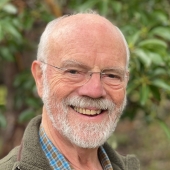
UNCLE-SAM- Developing biomining applications of seaweeds for sustainable, domestic production of critical REE mineral feedstocks
Thomas Mumford, Investigators, PNNL & Marine Agronomics, USA

UNCLE-SAM- Developing biomining applications of seaweeds for sustainable, domestic production of critical REE mineral feedstocks
Thomas Mumford, Investigators, PNNL & Marine Agronomics, USA
About speaker:
Tom received a BA from Wabash College (1966) and served in the US Army from 1966-1969. He received a PhD in Botany from the University of Washington (1973) then spent three years at UBC on a postdoctoral fellowship before joining the Washington Department of Natural Resources in 1976. At WDNR he developed cultivation of seaweeds for the production of phycolloids (Mazzaella) and food (Pyropia), and developed and managed programs for management and inventory of seaweeds and seagrasses on state-owned aquatic lands. He has taught in various universities and consulted overseas in seaweed aquaculture. Since his retirement in 2011, he has focused on researching marine algal biodiversity, the role of kelp in marine ecosystems, on kelp restoration, and on teaching. He was lead biologist for an ARPA-E projects to grow kelp for biomass (NOMAD), for biorefining rare earth elements from seaweed (UNCLE-SAM) and currently a co-investigator on the project Exploring Macroalgae as Critical Mineral Crops (EMC2). He has worked to develop a kelp conservation and recovery plan for Washington State and is acting in an advisory role for the Puget Sound Restoration Fund’s kelp restoration project.
Companies:
Pacific Northwest National Laboratory- Sequim. The PNNL-Sequim campus, in Sequim, Washington, houses the only marine research facilities in the Department of Energy complex. The campus is uniquely positioned for marine-based research that is focused on helping the nation achieve sustainable energy, a sustaining environment, and coastal security.
Marine Agronomics- A sole-proprietorship LLC of Thomas Mumford providing consulting and teaching expertise in algal cultivation with special expertise in kelp, carrageenophytes, and nori (Pyropia/ Porphyra), restoration of marine macroalgae (seaweeds), management of marine algal resources, and taxonomic identification services for marine macroalgae.
Presentation:
The UNCLE-SAM project, under the Biotechnologies to Ensure a Robust Supply of Critical Materials for Clean Energy program (ARPA-E), examined the biomining applications of seaweeds for sustainable, domestic production of critical mineral feedstocks. Marine macroalgae, often referred to as seaweeds, bioconcentrate critical minerals from seawater, including rare earth elements (REE) and platinum group metals (PGM). This presentation will explain how we successfully evaluated the technological feasibility for marine macroalgal cultivation as a feedstock for critical minerals, explored the biological capacity of different seaweeds to provide economically relevant domestic mineral production, assessed processing techniques for thermal co-conversion of seaweeds into renewable fuel and mineral feedstocks, and executed techno-economic and lifecycle assessments for identifying the most critical gaps in our current understanding to move the technology into commercially relevant deployment. Further development of this technology has been funded. Exploring Macroalgae as Critical Mineral Crops, (EMC2) will better the understanding of causes of natural variability in REE content of marine macroalgae with commodity-scale feedstock potential, discover the mechanisms that drive hyperaccumulation and visualize the spatial distribution of REE in macroalgal tissues, capture the REEs while preserving biomass for the cascading biorefinery using a recyclable lixiviant, decomplex and recycle the lixiviant, selectively adsorb REE using metal organic frameworks, and purify REEs and PGMs to a market-ready state with engineering support for moving the system towards an economic and environmentally favorable refinery with data feedback from sustainability modeling.